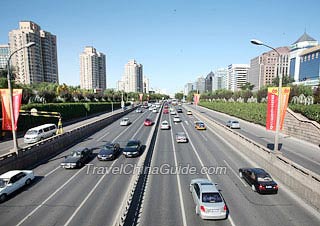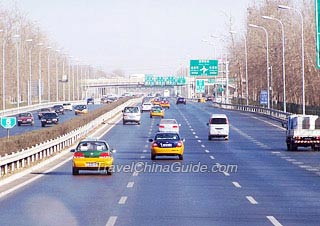Highway in China
Having such a vast territory and the world's largest population, China depends on its numerous and complicated highways at all levels crisscrossing the country in a dense network. The hallmark of the modernization of transportation, or even a country, is the expressways. More advantageous for safety, speed, economy, convenience and capacity, these are being developed rapidly.
By the end of 2012, the total mileage of all highways in China had already reached 2,633,060 miles (4,237,500 kilometers); in 2013 over 37.47 billion passengers traveled by highway. The total length of expressway has reached 64,913 miles (104,468 kilometers) by the end of 2013.
Almost all cities, counties and towns in the city are accessible by highways. In 1988, the first expressway (Shanghai City - Jiading County) in China was opened. Now, 20 provinces have expressways of over 1,242 miles (2,000 kilometers), such as Shandong, Guangdong, Jiangsu, Henan, Hebei. As the capital of China, Beijing is the starting point of 11 national highways, radiating out to all parts of the country, including cities such as Shenyang, Changchun, Harbin, Jinan, Shanghai, Hangzhou, Fuzhou, Xiamen, Shenzhen, Guangzhou, Shijiazhuang, Zhengzhou, Wuhan, Changsha, Taiyuan and Xi'an.
Bridge and tunnel construction, which is absolutely necessary to highway building in some special areas, also has achieved great success. By the end of 2012, there were 713,400 highway bridges and 10,022 highway tunnels.
Huge investments are being made to maintain and afforest the highways. With the increased demands of China's tremendous development the highway system is playing an ever more vital role in the country's transportation. Increasing by thousands of kilometers a year, many highways, including roads and expressways, are now in the process of design for construction in the near or far future.
By the end of 2012, the total mileage of all highways in China had already reached 2,633,060 miles (4,237,500 kilometers); in 2013 over 37.47 billion passengers traveled by highway. The total length of expressway has reached 64,913 miles (104,468 kilometers) by the end of 2013.
Almost all cities, counties and towns in the city are accessible by highways. In 1988, the first expressway (Shanghai City - Jiading County) in China was opened. Now, 20 provinces have expressways of over 1,242 miles (2,000 kilometers), such as Shandong, Guangdong, Jiangsu, Henan, Hebei. As the capital of China, Beijing is the starting point of 11 national highways, radiating out to all parts of the country, including cities such as Shenyang, Changchun, Harbin, Jinan, Shanghai, Hangzhou, Fuzhou, Xiamen, Shenzhen, Guangzhou, Shijiazhuang, Zhengzhou, Wuhan, Changsha, Taiyuan and Xi'an.
 |  |
Huge investments are being made to maintain and afforest the highways. With the increased demands of China's tremendous development the highway system is playing an ever more vital role in the country's transportation. Increasing by thousands of kilometers a year, many highways, including roads and expressways, are now in the process of design for construction in the near or far future.
- Last updated on Jul. 22, 2024 by Brenda Lian -